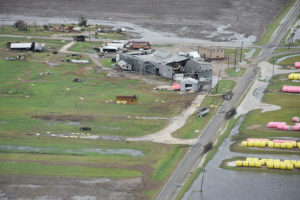Cornucopia’s Take: Conventional and GMO farming practices have sped up the removal of carbon from the soil, a contributor to climate change. Organic, sustainable agricultural practices help sequester carbon in the soil, prevent erosion, improve soil fertility, and mitigate climate change.
Farming has changed climate almost as much as deforestation
CBC News
Thomson Reuters
Harvesting, tilling remove large amounts of carbon from soil
 |
by Hurricane Harvey Source: Joseph Floerke/USDA |
Agriculture has contributed nearly as much to climate change as deforestation by intensifying global warming, according to U.S. research that has quantified the amount of carbon taken from the soil by farming.
Some 121 billion tonnes (133 billion tons) of carbon have been removed from the top two metres of the earth’s soil over the last two centuries by agriculture at a rate that is increasing, said the study in PNAS, a journal published by the National Academy of Sciences.
Global warming is largely due to the accumulation of carbon dioxide in the atmosphere from such activities as burning fossil fuels and cutting down trees that otherwise would absorb greenhouse gases such as carbon dioxide.
But this research showed the significance of agriculture as a contributing factor as well, said Jonathan Sanderman, a soil scientist at the Woods Hole Research Center in Falmouth, Massachusetts and one of the authors of the research.
While soil absorbs carbon in organic matter from plants and trees as they decompose, agriculture has helped deplete that carbon accumulation in the ground, he said.
Widespread harvesting removes carbon from the soil as do tilling methods that can accelerate erosion and decomposition.
“It’s alarming how much carbon has been lost from the soil,” he told the Thomson Reuters Foundation. “Small changes to the amount of carbon in the soil can have really big consequences for how much carbon is accumulating in the atmosphere.”
Sanderman said the research marked the first time the amount of carbon pulled out of the soil has been spatially quantified.
The 121 billion tonnes of carbon lost from soil compares to about 127 billion tonnes (140 billion) tons lost due to deforestation, he said, mostly since the mid-1800s and the Industrial Revolution.
Crop rotation, no-till farming could help
But the findings show potential for the earth’s soil to mitigate global warming by absorbing more carbon through such practices as better land stewardship, more extensive ground cover to minimize erosion, better diversity of crop rotation and no-till farming, he said.
The world’s nations agreed in Paris in 2015 to reduce emissions of greenhouse gases generated by burning fossil fuels
that are blamed by scientists for warming the planet.
President Donald Trump pulled the United States out of the landmark Paris accord in May, saying it would undermine the U.S. economy and weaken national sovereignty.
Supporters of the accord, including some leading U.S. business figures, said Trump’s move was a blow to international
efforts to tackle global warming that would isolate the United States.

